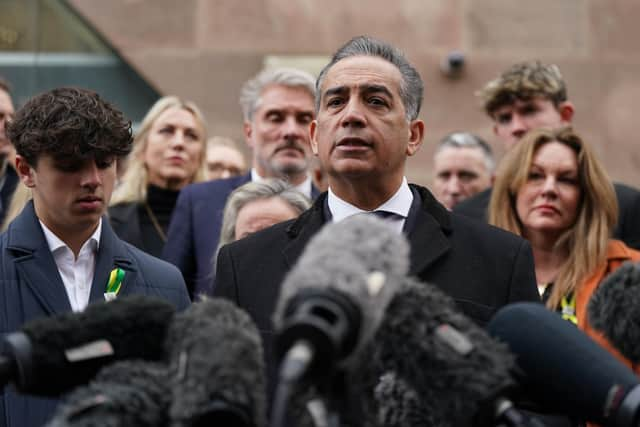How much longer can the country tolerate the epidemic of knife crime? - Jayne Dowle
The boys, named as Max Dixon, 16, and Mason Rist, 15, were attacked by a group of people in the Knowle West area of the South West’s largest city around half past eleven on Saturday night. Both later died in hospital.
Local people, speaking to reporters, expressed their despair that nothing was being done by politicians (or police) to prevent the insidious spread of stabbings in their neighbourhood. One heartbroken mother sobbed that she hates where she lives because she fears her children will never, ever be safe.
Advertisement
Hide AdAdvertisement
Hide AdThese two mindless killings came only days after Sinéad O’Malley, mother of Grace O’Malley-Kumar, the Nottingham student stabbed to death by paranoid schizophrenic Valdo Calocane, called for mandatory prison sentences for carrying a knife. “A knife… is not just an offensive weapon or something you could eat your food with. It is a lethal weapon,” said the consultant anaesthetist in an interview.


The court at Calocane’s trial heard that 19-year-old Grace had shown “incredible bravery” trying to defend her fellow student Barnaby Webber from Calocane before being fatally stabbed herself. How many parents’ hearts stopped a beat at learning this? Mine certainly did.
Meanwhile, whilst Max and Mason were dying and the families of all three Nottingham victims – Ian Coates, a 65-year-old grandfather and school caretaker, was also killed by Calocane - were attempting to come to terms with the senseless loss of their loved ones, yet again people in our own Yorkshire cities were also falling victim to stabbings.
In Leeds, officers were called to an address on Glensdale Mount in the East End Park area at 9.56am last Saturday and a man was taken to hospital to be treated for stab wounds to his leg.
Advertisement
Hide AdAdvertisement
Hide AdAnd in Sheffield, just seven hours later, a teenager ended up in hospital in a serious condition following a stabbing in Sharrow Lane.
Knife crime is everywhere. How much longer can our country tolerate such levels of callous violence?
It is not unreasonable for Grace O’Malley-Kumar’s father, Sanjoy, a GP, to call knife crime an “epidemic” and condemn existing legislation as “easy going”.
The stark truth is, following a drop during the Covid pandemic, knife crime statistics have again started to rise.
Advertisement
Hide AdAdvertisement
Hide AdIn the year ending March 2023, there were around 50,500 offences involving a sharp instrument in England and Wales (excluding Devon & Cornwall). This was 4.7 per cent higher than in 2021/22, according to police recorded crime figures.
Yet no-one seems to know what to do to stop the stabbings.
The point is that knives can be just as lethal as guns – as all those bereaved families know – but they are far more difficult to regulate. This rapidly needs to become part of a national conversation.
Actor and rapper Idris Elba, who grew up in the tough London neighbourhoods of Hackney and Canning Town, is launching a new campaign titled ‘Don’t Stop Your Future’, calling on increased government urgency to tackle knife crime.
He argues, however, that mandatory prison sentences could do more harm than good. Being sent to jail is highly likely to draw young people into further criminality, he says, as youth custodial sentences are associated with high levels of reoffending.
Advertisement
Hide AdAdvertisement
Hide AdAnd yes, life in an overcrowded, under-resourced prison would do little to deter offenders from carrying knives in future, and probably reinforce the macho status associated with knife crime.
All the research suggests that young people may carry knives for status, sometimes because they fear attack from their peers, and sometimes because they are coerced into it, if they are exploited into county lines gangs, for instance.
All of this is not going to stop until the root causes of knife possession and subsequent crime are tackled; poverty, broken social and community structures, the overriding feeling that in too many of our fractured and divided communities, there is no hope.
The government’s answer? Close a loophole banning the sale and criminalising possession of so-called ‘zombie knives’ - horrific, machete-style weapons - but ignore the fact that sharp knives can be found in any kitchen drawer. Let’s be honest. Ministers have given up, haven’t they? Not one in the Home Office has been forceful enough to come up with a zero tolerance stance that has a chance of working.
Comment Guidelines
National World encourages reader discussion on our stories. User feedback, insights and back-and-forth exchanges add a rich layer of context to reporting. Please review our Community Guidelines before commenting.
